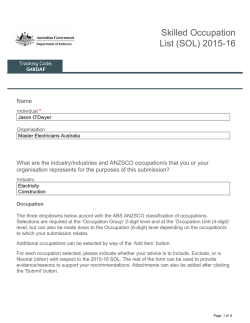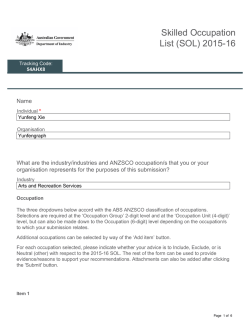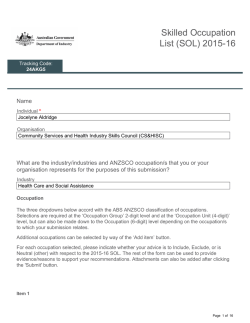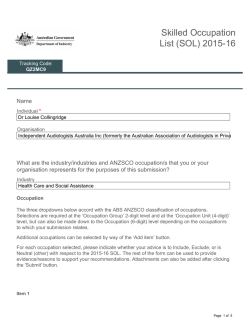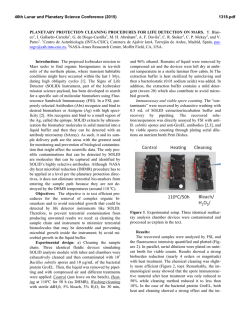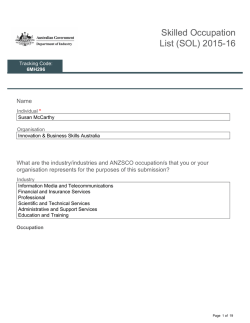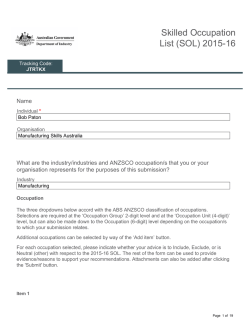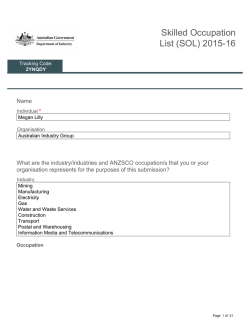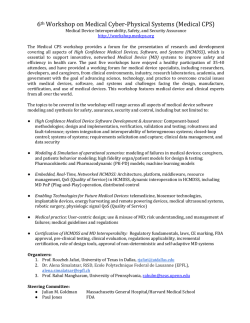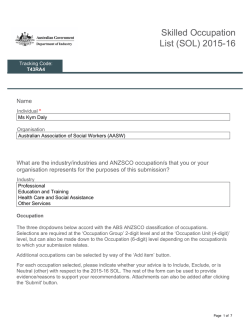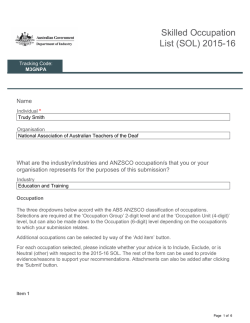
Skilled Occupation List (SOL) 2015-16
Skilled Occupation List (SOL) 2015-16 Tracking Code: ZBG3B9 Name Individual * Kerryn Wollington Organisation The LDC Group Asia Pacific Pty Limited What are the industry/industries and ANZSCO occupation/s that you or your organisation represents for the purposes of this submission? Industry Other Services Occupation The three dropdowns below accord with the ABS ANZSCO classification of occupations. Selections are required at the ‘Occupation Group’ 2-digit level and at the ‘Occupation Unit (4-digit)’ level, but can also be made down to the Occupation (6-digit) level depending on the occupation/s to which your submission relates. Additional occupations can be selected by way of the ‘Add item’ button. For each occupation selected, please indicate whether your advice is to Include, Exclude, or is Neutral (other) with respect to the 2015-16 SOL. The rest of the form can be used to provide evidence/reasons to support your recommendations. Attachments can also be added after clicking the 'Submit' button. Item 1 Page 1 of 6 Occupation Group * Cleaners and Laundry Workers Occupation Unit * Laundry Workers Occupation All Summary advice for 2015-16 SOL * Include Exclude Neutral Are there any occupations that you represent where there is evidence of imbalances in the demand for and supply of skills in the medium-to-long term? * Over the next 10 years nationally we will loose more than 50% of our workforce due to retirement .The industry is not being pro active in encouraging sustainability by training new employees and is employing casual staff to try to sustain operations rather than growing staff to further the industry. The industry is growing with the construction of 3 new major laundrys in the last 12 months in Sydney alone. Catering for the hospitality, health care and aged care sectors the industry is grossly overlooked and placed with brothels and funeral pallor within the industry sector.. Through lack of training and no training funding the Australian Standard for Laundrys is being grossly ignored. With such a growth industry and little effort from the industry being put into looking at the future of the industry funding employees is getting difficult. Employment shortages for the industry does not show up in any skills shortages due to the lack of advertising in main stream papers where numbers are taken from and lack of industry feedback. Less than 20% of the industry hold any qualification of laundry operations yet we rely on the industry on a daily basis to provide disinfected linen. Over the next 10 years the demand for qualified employees as older staff retire will far outstrip the 20% of industry total to be able to take over the industry. Page 2 of 6 Even the age of those who are currently training figures from MSA and NCVER show the average age of trainees is between 40-55 which means there employees will go out the door with the retires. The steadiest laundry training is happening in the jail system in NSW, Tasmania, Victoria and WA however for example in NSW the Government run linen services of which there are 7 will not employee former inmates (ironic). Dry cleaning also has the exact same issue. An industry which handles toxic and hazadous chemicals is employing overseas students part time who are trained and return to the own country's The hospital industry Australia wide uses dry cleaning as a means of removing oil from surgical linen without qualified staff and no training funding available. Trying to find a press with or without qualifications is impossible today, without even looking at the future.. Is there evidence of imbalances in the demand for and supply of skills in the medium-to-long term in non-metropolitan areas? If so, can you indicate in what part of Australia and the number in the occupation in over or undersupply. This is a national issue regionally there are very few qualified industry people and finding employees is very difficult and both the dry cleaning and laundry industry will take on any one who will apply for the positions but no one is training due to the lack of training funding. The industry especially regionally through out Australia does not maintain compliance with the Laundry Standard by having skilled employees and regular updates of compliance. There is also regionally a major issue of who cares out here, however they are not looking at what happpens when they retire and now one has the skills to replace them in their positions Are there any occupations which require formal licensing or registration arrangements in order to practice/perform in this occupation? Page 3 of 6 For example: • Midwives are required to register with the nurses board in their state or territory • Panelbeaters are required to be registered or certified with the state Motor Vehicle Repair Industry Authority In the laundry and dry cleaning industry no licensing is legally required Laundry the Laundry Standard AS/NZS 4146 2000; states all employees should be training in laundry operations which is not happening also that it is a minimum requirement of all leading hands and supervisors which the training numbers back up that this is not the case. Also no laundry in any hotel, hospital, or aged care facility in Australia meets the Standard requirement of update skills and qualifications as per the Standard. With all the current issues over outbreaks of disease this is becoming a major industry issue which seams to be being ignored by all Government departments both Federal and State Dry cleaning have been trying to license the industry but to no avail, handling toxic chemicals and there disposal is handled by an industry who have less than 10% of an industry with any skills. Is it expected that your employment sector will be impacted by any medium-to-long term trends which will impact upon demand and/or supply (excluding costs associated with training, labour hire, and international sponsorship)? Please provide evidence (e.g. data source, policy document) which substantiates these claims. For example: • New benchmarks for childcare centres mandate increased staff-to-child ratios and higher qualification standards for childcare workers. Currently both the laundry and dry cleaning industry do not collect data and the laundry industry has an Association in only 2 States which are active. The Dry Cleaning Industry has a National Association and a separate Association in both WA and SA but no data is collected. Any request for information is largely ignored by the industry It is only that we are in the industry Nationally that we know our industry and see what is happening Page 4 of 6 Please provide any other information you consider relevant evidence to support your submission For example, you may know of some independent studies about your occupation that supports your advice to us. There is non directly. MSA have been looking at the industry but due to a lack of consultation with the industry have not been able to obtain much data. Chartess in NT have realised there is an issue with the age of emloyees and lack of industry support in the NT and are making efforts to support the industry. FFTI WA have been successful with consultation with the industry in WA but training ages are the main level of data providing the informaiton Would you like to make any additional comments on the SOL? From a training point of view. To many RTO.s including the TAFE do not meet the requirements of ASQA and the NVR Standard which is seeing the industry with trainers who have no networking or industry base thus the lack of feedback and data on what is occurring in the industry. This is also why there is a lack of non compliance with the Laundry Standard especially in On premiss laundrys in hospitality, aged care and hotel dry cleaning valets especially in remote and regional areas. Please provide the name, position and contact details of a person within your organisation who is willing to be contacted if any further information or follow-up is required. Name * Kerryn Wollington Position * Head Trainer/Project Manager Contact details * 02 49588817 0416052528 Page 5 of 6 All information, including name and address details, contained in submissions will be made available to the public on the Department of Industry website unless you indicate that you would like all or part of your submission to remain in confidence. Automatically generated confidentiality statements in emails do not suffice for this purpose. Respondents who would like all or part of their submission to remain in confidence should provide this information in an email to SOL@industry. gov.au . Legal requirements, such as those imposed by the Freedom of Information Act 1982, may affect the confidentiality of your submission. Page 6 of 6
© Copyright 2026

